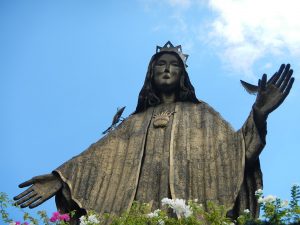Philippine President Rodrigo Duterte has reportedly instructed allies in Congress to begin proceedings aimed at amending the country’s constitution, fueling immediate speculation that he is aiming to extend his term beyond 2022.
Unlike in Myanmar and Thailand, where proposals to amend the constitution are often aimed at eroding the power of the military, in the Philippines, the push for “charter change,” as it is known locally, has always been instigated by politicians in power seeking to remove election term limits.
It was the military that led the drafting and approval of the constitutions of Myanmar and Thailand, which guaranteed the retention of the army’s influence in the civilian-led bureaucracy of the two countries.
In the case of the Philippines, its 1987 Constitution was written in the aftermath of the 1986 People Power movement that toppled the Marcos dictatorship. It contains provisions that restricted the Martial Law powers of the executive and imposed term limits for elected officials: the president and vice president can only serve for a single six-year term.
If there is some doubt about Duterte’s avowed intentions, it is linked to previous unpopular attempts of his predecessors to force through amendments to the constitution.
In 1997, President Fidel Ramos introduced a charter change proposal a year before the expiration of his term. It sparked outrage from the public who saw it as a ruse of Ramos to prolong his rule. In the end, the Asian Financial Crisis that year and the massive protest led by the Catholic Church stopped Ramos from pursuing changes to the constitution.
Ramos’ successor, Joseph Estrada, replaced the phrase “charter change” with the phrase “Constitutional Correction for Development” in order to win public support for the changes. Estrada said his objective is to remove so-called nationalist provisions of the constitution, which stipulate that companies, industries, land, and investment operations should be majority-owned by Filipinos. Estrada soon abandoned the proposal after his government faced corruption scandals which led to his ouster in 2001.
Estrada was succeeded by Gloria Macapagal-Arroyo whose re-election in 2004 was mired with allegations of fraud. A taped recording evidence against Arroyo surfaced in 2005 but key allies in Congress backed her presidency with a condition that she would support Charter Change and shift the country’s form of government into a parliamentary system. In 2009, Arroyo’s allies in the House of Representatives tried to form a constituent assembly that would amend the constitution without the participation of the opposition-dominated Senate, but this triggered widespread protests.
Duterte won in 2016 on a platform of federalism that would require the amendment of the constitution. But Duterte has never made this into a priority agenda in the past four years, and it was only last month when concrete proposals for charter change began to be deliberated in Congress.
According to congressional leaders, Duterte only wanted to focus on “economic” charter change to boost foreign investment. However, Duterte also told the senate president that charter change will be pursued in aid of the government’s anti-communist campaign, by overhauling the party list system.
Indeed, it is difficult to believe that charter change will be restricted to economic provisions. There are previous proposals that can be easily revived such as the removal of the ban on foreign bases, the ban on nuclear weapons, the prohibition of political dynasties, and the insertion of the word “responsible” in the bill of rights guaranteeing freedom of speech and expression.
Naturally, some members of the commission which drafted the 1987 Constitution opposed the Congress proposal and reminded legislators not to blame “nationalist” constitutional provisions for the country’s underdevelopment.
Various business groups issued a statement rejecting charter change and questioning the necessity of this political exercise given that presidential elections will take place next year.
“Any attempt at charter change now will be highly divisive at a time when our country still needs to be totally united in our efforts to overcome the ill effects of the pandemic,” the groups added.
Duterte’s allies insist that charter change is needed to stimulate the local economy amid the COVID-19 pandemic. Some are in favor of easing the economic restrictions but warned that the amendments could benefit the interest of China, which has developed closer ties with the Duterte government.
Civil society groups cited the human rights record of Duterte in opposing charter change, which they believe can lead to the erosion of the checks and balances in government and pave the way for the rise of an authoritarian government.
Despite the public health crisis in 2020, the government prioritized the passage of an anti-terror law. It also ordered the shutdown of a critical media network. Extrajudicial killings continued with impunity amid lockdown restrictions. The cabinet remains dominated by retired military generals. In other words, Duterte has consolidated power and may use his remaining time in office to accomplish what previous presidents have aspired but failed to do. Will Duterte succeed or will he just fan the flames of discontent as more people express exasperation over the government’s political priorities?













